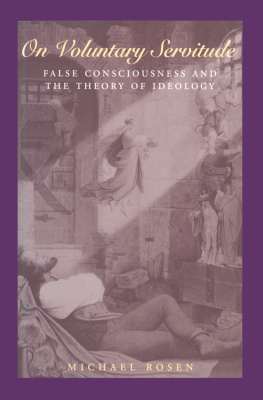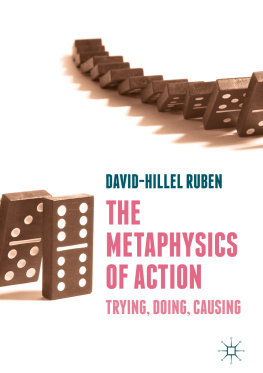En, Berent , formerly Professor Emeritus, University of Wisconsin-Madison
How We Act
Causes, Reasons, and Intentions
Publication date 2003 (this edition)
Print ISBN-10: 0-19-925602-0
Print ISBN-13: 978-0-19-925602-0
doi:10.1093/0199256020.001.0001
Abstract: Attempts to answer the question of whether it is possible to understand agency as realized within a world construed 'naturalistically', that is, in terms of causal relations among events and states of affairs, or whether an adequate ontology requires sui generis acts that are essentially voluntary, such as volitions or agent-causation. Berent En defends the possibility of naturalizing agency via a causal theory of action (CTA). In doing that, he develops his key notion of basic action (Chs 2 and 3); he offers a 'general and original' solution to the problem of causal deviance (Ch. 4); and, he attempts to answer the objection that CTA removes the agent from the picture altogether by offering a purely causal model for the deliberative process that underlies practical reasoning (Ch. 5). Furthermore, the book discusses objections to volitional theories (Ch. 1), intentions and intentional action (Ch. 6), and the compatibility of En's CTA with attractive accounts of autonomy and freedom (Ch. 7).
Keywords: agency,agent-causation,autonomy,basic action,causality,causal deviance,causal theory of action,deliberation,En,freedom,intentions,naturalism,ontology,practical reasoning,volitions

Great Clarendon Street, Oxford ox 2 6 dp
Oxford University Press is a department of the University of Oxford.
It furthers the University's objective of excellence in research, scholarship,
and education by publishing worldwide in
Oxford New York
Auckland Bangkok Buenos Aires Cape Town Chennai
Dar es Salaam Delhi Hong Kong Istanbul Karachi Kolkata
Kuala Lumpur Madrid Melbourne Mexico City Mumbai Nairobi
S o Paulo Shanghai Taipei Tokyo Toronto
Oxford is a registered trade mark of Oxford University Press
in the UK and in certain other countries
Published in the United States
by Oxford University Press Inc., New York
Berent En 2003
The moral rights of the author have been asserted
Database right Oxford University Press (maker)
First published 2003
All rights reserved. No part of this publication may be reproduced,
stored in a retrieval system, or transmitted, in any form or by any means,
without the prior permission in writing of Oxford University Press,
or as expressly permitted by law, or under terms agreed with the appropriate
reprographics rights organization. Enquiries concerning reproduction
outside the scope of the above should be sent to the Rights Department,
Oxford University Press, at the address above
You must not circulate this book in any other binding or cover
and you must impose this same condition on any acquirer
British Library Cataloguing in Publication Data
Data available
Library of Congress Cataloging in Publication Data
Data available
ISBN 0-19-925602-0
10 9 8 7 6 5 4 3 2 1
Typeset by Kolam Information Services Pvt. Ltd., Pondicherry, India
Printed in Great Britain
on acid-free paper by
T. J. International Ltd.,
Padstow, Cornwall
end p.iv
ACKNOWLEDGEMENTS
The idea for this book was inspired by the enthusiasm of my students in a seminar I taught at the University of Wisconsin-Madison in 1998. Since then I have benefited from the critical input I received from my students in other courses on related topics, and from colleagues who have read different chapters at various stages of incompletion and have helped me with their generous feedback.
The list of the students who have corrected my mistakes and given me new ideas is too long to produce here. But I would like to express my special appreciation to the help given to me by Joey Baltimore, Martin Barrett, Tom Bontly, Sara Chant, Zachary Ernst, Noel Hendrickson, Greg Mougin, Sara Gavrel Ortiz, and Richard Teng.
Among colleagues, I would especially like to express my gratitude to Fred Dretske, who read an earlier version of all of the chapters, and to two anonymous referees of OUP, whose critical input and helpful suggestions helped improve the penultimate draft. In addition, I am deeply indebted to the supererogatory efforts of many of my colleagues who read several of the chapters and provided invaluable critical appraisal. In this connection, I especially thank Ellery Eells, Brie Gertler, Daniel Hausman, Terry Penner, Larry Shapiro, Alan Sidelle, Elliott Sober, and Dennis Stampe.
In addition, papers that form the nucleus of some of the chapters were read at colloquia, and I benefited from the comments I received from the members of the audience at University of Calgary, University of Alberta, King's College London, University of Warwick, and Duke. Special thanks are due to Gven Gzeldere, Mohan Matthen, David Papineau, Michael Luntley, and David Sanford.
Finally, I would like to thank my long-time friend, James A. Jung, for suggesting the title of this book to me, and urging me to pay more attention to John Dewey, and to his views on habit. (I fear his advocacy for Dewey has gone unheeded.)
Throughout the four years from its conception to its conclusion of this project my wife Jennifer Vaughan Jones has been so unconditionally encouraging and supportive that I doubt, without her, I would
end p.vii
have started it; and I am sure, without her, I would not have completed it.
Parts of Chapter were taken from my 'Causal Theories and Unusual Causal Pathways', published in 1989 in Philosophical Studies, 55: 231-61. This has been made possible with kind permission from Kluwer Academic Publishers.
Parts of Chapter were taken from my 'Units of Behavior' published in 1995 in Philosophy of Science, 62: 523-42. The copyright is 1995 by the Philosophy of Science Association. Permission to use this material has been granted by the University of Chicago Press.
The Publisher very much regrets Berent En's untimely death after submission of his typescript, and would like to thank Fred Dretske for his help in overseeing the book through to publication.
end p.viii











